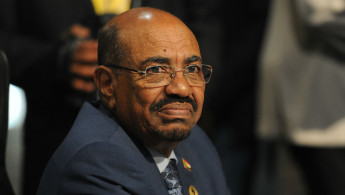Is international justice blind? Africa doesn't think so
Is international justice blind? Africa doesn't think so
Analysis: An attempt to have Sudan's Omar al-Bashir arrested on ICC charges has brought the court's apparent bias against Africa back into the headlines. But is it really biased?
3 min read
Bashir is wanted for crimes committed in Darfur [Getty]
Sudan President Omar al-Bashir flew out of South Africa on Monday, dodging a court order for him to stay as South African judges weighed up whether he should be arrested over alleged war crimes and genocide.
Bashir had travelled to Johannesburg for an African Union summit that was overshadowed by the International Criminal Court (ICC) calling for him to be arrested on long-standing warrants over the Darfur conflict.
"South Africa has shamefully flouted ICC and domestic court to free man wanted for mass murder of Africans," Kenneth Roth, director of Human Rights Watch, said on Twitter.
The ICC had called on South Africa, a signatory of the ICC, "to spare no effort in ensuring the execution of the arrest warrants" against Bashir, 71, who seized power in Sudan in an Islamist-backed coup in 1989.
Criticism of the court
South Africa's ruling ANC condemned the court's order on Sunday, saying in a statement: "The ANC holds the view that the International Criminal Court is no longer useful for the purposes for which it was intended.
| The ANC holds the view that the International Criminal Court is no longer useful for the purposes for which it was intended. |
The ICC, which started operating in July 2002, has been criticised for only targeting African leaders. The court has eight active investigations under way and has conducted 18 prosecutions - all of them against Africans.
John Mukum Mbako, writing for the Brookings Institute, notes that "African governments argue that the ICC is practicing a form of "selective justice" and that it is avoiding diplomatically, economically, financially and politically strong countries... because these countries can threaten the ICC's existence."
Is the ICC biased?
However, according to ICC Prosecutor Fatou Bensouda, there are good reasons why the ICC is only involved in investigations in Africa.
Bensouda said the ICC's jurisdiction is limited to war crimes, crimes against humanity and genocide committed after 2002 by states that have accepted the court's jurisdiction and their citizens, or where a situation has been referred to the court by the UN Security Council.
Even then, she added, the court may not have the authority to investigate if credible national investigations or prosecutions were taking place.
Moreover, she said, investigations into African cases had been opened at the request of or with the support of African states. Three of the cases the court was currently investigating were referred to the court by African states, she said, and two by the Security Council.
One of these cases referred to the court by the Security Council was the situation in Darfur.
Another criticism levelled at the ICC indictment against Bashir and other serving heads of state in Africa is that this is prohibited by the immunity heads of state enjoy, even for international crimes.
However, according to Margaret de Guzman, an associate professor at Temple University, this provision in international law was unclear and that the ICC had interpreted it "in a plausible fashion".
In any case, Reuters reported that all those attending the summit had been granted immunity by the South African government, so Bashir's arrest was unlikely.


![Minnesota Tim Walz is working to court Muslim voters. [Getty]](/sites/default/files/styles/image_684x385/public/2169747529.jpeg?h=a5f2f23a&itok=b63Wif2V)






